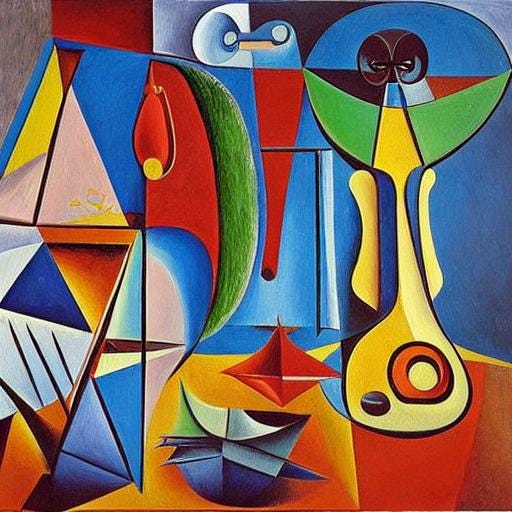(Read this on the web browser if you prefer)

Hey friends!
How are you doing?
My smartphone’s screensaver tells me that we only have 77 days till the end of the year, how did that happen!?
It’s time to start planning for the end-of-the-year review and goals for 2024.
I’ve been doing this since never, but I won’t have a better year to start than this, so let’s do it!
If you have done this before, please share your system and tips with me, it would be very helpful.
If you haven’t, maybe it’s a good time to start, so why don’t you join me?
Anyway, we have 77 days left in 2023, let’s make those count, shall we?
🧽 What I’m Soaking In
What I’ve been doing:
Community management for Think in Frameworks (Cohort 3 is coming, check it out!).
Doing Write of Passage for the 3rd time (the online writing course that made me start writing online).
Writing essays. You know when someone calls you and you say you’re coming but then times morph into the speed of light and 3 seconds become 2 hours? You can read about it here:
Obsessing with Online Communities. ⤵️⤵️⤵️
🦉 Soaking Up Knowledge
How to build an online community
First of all, a true community around any topic must grow organically, i.e. you can’t artificially create it. You can (and should) however, design as many facilitating situations as possible that may potentiate the growth and strengthening of the community.
Create community events to take place at different times to suit different availabilities from the community - this is especially true when having people from around the world.
Make it as easy as possible for communication to occur within the community (both synchronous and asynchronous).
Create spaces for people to share ideas, some more open, where anyone can write about whatever they feel like, others more narrowed, where prompts are given. This is to allow the participation of those who have more initiative and to encourage those who are more reserved.
Incentivize (and facilitate) the creation of events from the community to the community.
Be always open to feedback and suggestions. Feeling the pulse of the community is critical for its sustainability.
By designing these facilitating situations you are complementing the 2 core aspects of a strong community:
A common topic that gathers the interest and excitement of the community in the first place.
A genuine passion for that topic, and the conviction that teaching or discussing it in the community will be beneficial for everyone.
📚 Books
Get Together: How to Build a Community With Your People
Short description (from their website):
Get Together is a guidebook on how to build a community.
The book spotlights all types of communities—fitness meetups, fan clubs, online groups, activist networks, communities around companies, nonprofits, and causes. And it breaks down practical steps about how to get people together, online and off.
The meta takeaway of the book: Build the community with the people, not for them.
🧠 Intellectual Curiosity
The time was the early 14th century, the place was medieval Europe.
In a chilly library surrounded by stone walls, burning torches illuminate the room, casting dancing shadows and creating a less austere ambiance.
Dozens of monks lean over large books, aided by small candle holders, transcribing their words onto new sheets of thick yellow parchment.
Suddenly, one of the monks exclaims in panic, "The ink has vanished!"
A commotion ensues, with the monks alarmed at the prospect of their work being jeopardized, particularly on a day when the team of scribes had been augmented with the arrival of new monks.
"Someone must've stolen the ink!" said one monk.
"Could there be a book here that our good Lord disapproves of, making the ink disappear as punishment?" another speculated.
"This must be the work of witchcraft!" another exclaimed.
Then a firm and calm voice rang out: "Numquam ponenda est pluralitas sine necessitate." (“Chill out dudes, there’s no need to stress about it and think of the worst.”)
William of Ockham spoke these words, which in Latin actually mean "plurality must never be posited without necessity." He then added, "We have double the number of monks transcribing today, the ink simply ran out because it was used by more scribes."
Alright, this story unfolded in my mind and not in medieval Europe, but it depicts the famous logical mindset of Friar William of Ockham (1285 - 1347).
Ockham made significant contributions to the development of Western constitutional ideas, being one of the earliest medieval writers to advocate a form of church/state separation.
He was also a proponent of free will, believing that individuals were capable of choosing and understanding right from wrong without any external influence.
His maxim "Plurality must never be posited without necessity" is at the root of what we today call Occam's Razor, the framework that suggests that when trying to explain or solve something, we should not make more assumptions than strictly necessary. If a simple explanation suffices, there's no need to add complexity.
In a world that can sometimes seem overwhelming and complicated, there’s elegance in simplicity, a lesson we've learned from William's razor-sharp insights (pun intended!).
Keep it simple, keep it smart.
🏁 Finish Line
And that’s it for today.
If you enjoy SOAK, you can expect good things very shortly.
If you don’t enjoy it, don’t worry, good taste can be built. I believe in you! 😉
Thank you for doing this with me, I hope I’ll see you next week!
-Danny









Danny, this is great! I never start planning for next year until the last week of December or even the first week of Jan (backpedaling into the year). All about starting now, cheers!